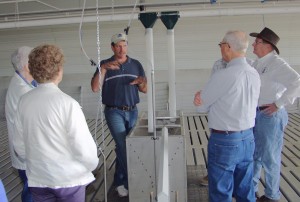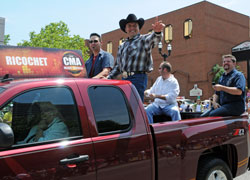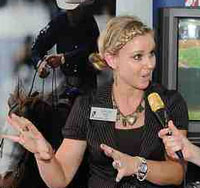Michael Waddell is the star of Bone Collectors on the Outdoor Channel. He was one of the competitors in the New Holland Celebrity Tractor Race, hosted by Michael Peterson.
Waddell gave it a valiant effort and hopefully will compete again next year.
Michael Waddell is the star of Bone Collectors on the Outdoor Channel. He was one of the competitors in the New Holland Celebrity Tractor Race, hosted by Michael Peterson.
Waddell gave it a valiant effort and hopefully will compete again next year.
It’s certainly not news to anyone in the agriculture industry that livestock producers, especially pork producers, are hurting. According to the National Pork Producers Council, pork producers, who prior to the announcement of the H1N1 “outbreak” were already losing money, have seen losses accelerate to an average of $17.69 on each hog marketed since May 1, 2009. Total losses have escalated to 7.2 million a day.
 Despite these many downfalls, pork producers aren’t going to give up without a fight. My neighbor and local pork producer, Brad Greenway, is determined to help producers through media outreach and consumer education, and he wants you to join the fight, too! I had a great chat with Greenway the other day, and he had some advice in serving as an agriculture advocate. Greenway has spoken to over 65 groups, as well as offering an open house at his own facilities. He’s a great resource for all agriculture enthusiasts. Thanks, Brad!
Despite these many downfalls, pork producers aren’t going to give up without a fight. My neighbor and local pork producer, Brad Greenway, is determined to help producers through media outreach and consumer education, and he wants you to join the fight, too! I had a great chat with Greenway the other day, and he had some advice in serving as an agriculture advocate. Greenway has spoken to over 65 groups, as well as offering an open house at his own facilities. He’s a great resource for all agriculture enthusiasts. Thanks, Brad!
Farmers count for less than 2% of the population in the United States, said Greenway. That’s why it’s so important for farmers to get out and explain to consumers how food is produced. It’s amazing that no matter where I’m at, in a big city or in a rural community, I always get the same questions. We have to get better at telling our story. With the ballot initiatives in California, Arizona and now Ohio, the animal rights issue is one that we are continually trying to combat. They want to change the way we raise our livestock. By using sound science and sharing our personal stories, we can work on public perception. I’m proud of the way we raise our livestock, and we can’t be afraid to stand up for our industry, even in the local coffee shop.
Start a good habit today and share the agriculture story with someone new!
I don’t know how many of you have had a chance to see Michael Peterson perform. With his permission I shot a video of him singing one of his biggest hits, “Drink Swear Steal & Lie” at the Hard Rock Cafe in Nashville last night. He was being backed up by the band Stony Run.
 The 2009 New Holland Celebrity Tractor Show, hosted by Michael Peterson, has concluded and we have a two time winner!
The 2009 New Holland Celebrity Tractor Show, hosted by Michael Peterson, has concluded and we have a two time winner!
He’s Darby Ledbetter, seen here with his wife, being interviewed by Cindy. I think Darby was pretty excited and did a victory lap with the checkered flag. I’ve updated the online photo album for your viewing pleasure. I’ll be posting more over the next couple days since I’m heading off to Denver immediately for the AFBF Public Relations conference. It’s going to be a busy week for AgWired.
Thank you Gene Hemphill, Dawn Fox, New Holland and Holly and John Fritz, H. B. Fritz & Associates for another fantastic week in country music city.
2009 CMA Music Festival Photo Album
You can listen to Cindy interview our race winner here:
 It has been a great day of country music at the CMA Music Festival in Nashville, TN. We got to watch Michael Peterson perform at Hard Rock Cafe before heading over to LP Field for the evening concert.
It has been a great day of country music at the CMA Music Festival in Nashville, TN. We got to watch Michael Peterson perform at Hard Rock Cafe before heading over to LP Field for the evening concert.
Tonight we had a very special performance by Wynonna and then she was joined on stage by her Mom, Naomi. It was a real emotional reunion and there are pictures in the photo album.
You’ll also find photos from other performers tonight like Trace Adkins.
 Novus International is celebrating a couple of significant milestones this year, which reminds me of the old ditty “Make new friends, but keep the old, one is silver and the other gold.” The gold would be Santoquin feed preservative which is celebrating 50 years, and the silver is the 25th anniversary of the company’s Chocolate Bayou, TX Alimet feed supplement plant.
Novus International is celebrating a couple of significant milestones this year, which reminds me of the old ditty “Make new friends, but keep the old, one is silver and the other gold.” The gold would be Santoquin feed preservative which is celebrating 50 years, and the silver is the 25th anniversary of the company’s Chocolate Bayou, TX Alimet feed supplement plant.
I interviewed Novus executive director of global marketing and products Scott Fleetwood at World Pork Expo about their portfolio of both new and older products. “We prefer to call them ‘seasoned products’ instead of ‘older products,” Scott says. “They are still as viable and essential to the producer as they were 25 or 50 years ago.”
“We are moving into different areas, more of functional foods, such as DHA, which is essential for eye, brain and heart health,” said Scott. “We are working with our customers to find ways to include DHA in meat, eggs, milk. We’re trying to help our customers’ customers and help consumers understand what it takes to provide them with affordable, wholesome food.”
Listen to or download my interview with Scott here:
 This year being not only my first CMA Music Festival but also my first time In Nashville, I really didn’t know what to expect. I knew there would be country music stars but was unaware of all the other attractions going on downtown. This festival brings in so many companies with booths and prizes that one day really isn’t enough! There is so much to do from watching the flying dog show to watching street performers like the Naked Cowboy. In addition to the already booming downtown, the festival brings in around 200,000 people to the area over four days! That is amazing.
This year being not only my first CMA Music Festival but also my first time In Nashville, I really didn’t know what to expect. I knew there would be country music stars but was unaware of all the other attractions going on downtown. This festival brings in so many companies with booths and prizes that one day really isn’t enough! There is so much to do from watching the flying dog show to watching street performers like the Naked Cowboy. In addition to the already booming downtown, the festival brings in around 200,000 people to the area over four days! That is amazing.
Most people come to watch performances throughout the day. Stars perform on many stages around downtown, from the Hard Rock to the waterfront to the main stage at LP Field. Entering LP Field for the first night of performances I could not believe the amount of people in the stands and on the field. I had never seen anything like it and was thrilled to be apart of that. Not only were so many people sweating it out in the stands for their beloved performers but they even toughed it out through the rain delay and stayed to watch til 3 in the morning! Now that is real country music dedication!
 One of the great things about the CMA Music Festival is the opportunity to meet stars of the stage. Michael Peterson introduced me to Ricochet. They were in the kickoff parade and will be competing in the New Holland Celebrity Tractor Race on Sunday.
One of the great things about the CMA Music Festival is the opportunity to meet stars of the stage. Michael Peterson introduced me to Ricochet. They were in the kickoff parade and will be competing in the New Holland Celebrity Tractor Race on Sunday.
I spoke with Troy, Greg, Heath and Robert after the parade. They said riding in the parade, “beat hauling hay.” They’ve got a new album out called “Ricochet Reloaded.”
They’re looking forward to racing tractors on Sunday since at least one of them “is an old tractor jockey from way back.” They think country music fans would be good tractor race fans. It only makes sense.
You can find them online and download their new single. Here’s where you can purchase the new album.
2009 CMA Music Festival Photo Album
You can listen to my interview with the band here:
 Sharing a booth with New Holland at the CMA Music Festival in Nashville this year is the American Paint Horse Association.
Sharing a booth with New Holland at the CMA Music Festival in Nashville this year is the American Paint Horse Association.
“New Holland is one of our corporate sponsors, which we are very proud to have on board, so we are happy to be here sharing a booth with them talking about horses while they talk about tractors,” says Ginger Walker, APHA director of special events.
 APHA is the second largest horse breed registry in the United States with nearly 100,000 members and Ginger says they are a very exceptional horse. “The color really sets them apart, they’re basically a stock horse with color and each one is unique – no two are alike, they’re like a snowflake,” said Ginger. “They’re very fun to ride and they can do all sorts of things.”
APHA is the second largest horse breed registry in the United States with nearly 100,000 members and Ginger says they are a very exceptional horse. “The color really sets them apart, they’re basically a stock horse with color and each one is unique – no two are alike, they’re like a snowflake,” said Ginger. “They’re very fun to ride and they can do all sorts of things.”
Visitors to the New Holland/APHA booth get to play Wii games to win Michael Peterson CDs. Ginger is shown here congratulating one young visitor on his Wii bowling score.
Listen to or download my interview with Ginger here:
Truckers and others learned about biodiesel on the Dave Nemo Show yesterday when NBB CEO, Joe Jobe, got behind the microphone with him and Michael Peterson. I recorded a segment for you on video. With support from New Holland, this program has been an annual deal. Perhaps Joe and Dave can get together more often now since fuel has become such an important issue, especially with the price volatility we’ve seen in the last couple years.